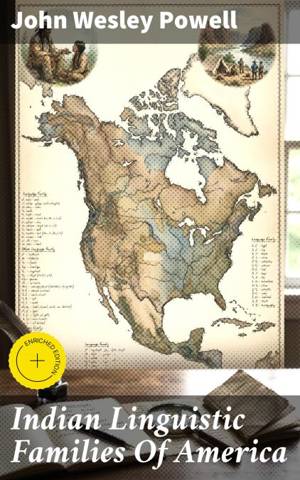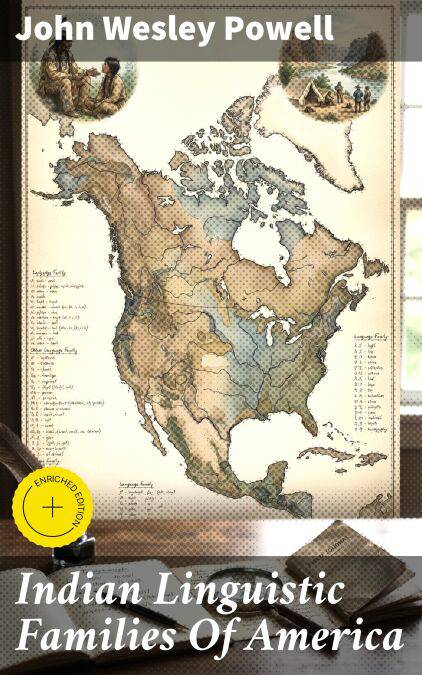
- Afhalen na 1 uur in een winkel met voorraad
- Gratis thuislevering in België vanaf € 30
- Ruim aanbod met 7 miljoen producten
- Afhalen na 1 uur in een winkel met voorraad
- Gratis thuislevering in België vanaf € 30
- Ruim aanbod met 7 miljoen producten
Zoeken
Indian Linguistic Families Of America E-BOOK
Enriched edition. Exploring the Rich Tapestry of Native American Language Diversity
John Wesley Powell
E-book | Engels
€ 0,49
Uitvoering
Omschrijving
In "Indian Linguistic Families of America," John Wesley Powell embarks on a pioneering scholarly examination of Native American languages, meticulously classifying and analyzing their diverse linguistic families. Written in 1891, the book employs a blend of empirical investigation and theoretical linguistics, exemplifying the literary style of early anthropological studies. Powell's work is notable for its comprehensive documentation and systematic approach, setting a foundation for subsequent research in indigenous languages. His exploration not only concentrates on the structural properties of these languages but also integrates cultural and historical contexts, illuminating the intricate relationship between language and identity among Native American populations. John Wesley Powell, an eminent American explorer, geologist, and ethnographer, carried profound interests in the natural sciences and native cultures, which profoundly influenced his writing. His experiences during the 1869 expedition down the Colorado River equipped him with a firsthand understanding of the cultural richness of Native American tribes. His commitment to preserving indigenous narratives and languages shines through in this text, rooted in his belief in the importance of documenting the diverse voices and histories of America'Äôs first inhabitants. "Indian Linguistic Families of America" is an essential read for linguists, anthropologists, and historians alike. Powell's authoritative insights not only enrich our understanding of indigenous languages but also promote an appreciation for the cultural heritage of Native Americans. This work serves as a vital resource for anyone interested in the complexities of language development and the shared narratives that connect diverse communities across the continent.
In this enriched edition, we have carefully created added value for your reading experience:
- A succinct Introduction situates the work's timeless appeal and themes.
- The Synopsis outlines the central plot, highlighting key developments without spoiling critical twists.
- A detailed Historical Context immerses you in the era's events and influences that shaped the writing.
- An Author Biography reveals milestones in the author's life, illuminating the personal insights behind the text.
- A thorough Analysis dissects symbols, motifs, and character arcs to unearth underlying meanings.
- Reflection questions prompt you to engage personally with the work's messages, connecting them to modern life.
- Hand‐picked Memorable Quotes shine a spotlight on moments of literary brilliance.
- Interactive footnotes clarify unusual references, historical allusions, and archaic phrases for an effortless, more informed read.
In this enriched edition, we have carefully created added value for your reading experience:
- A succinct Introduction situates the work's timeless appeal and themes.
- The Synopsis outlines the central plot, highlighting key developments without spoiling critical twists.
- A detailed Historical Context immerses you in the era's events and influences that shaped the writing.
- An Author Biography reveals milestones in the author's life, illuminating the personal insights behind the text.
- A thorough Analysis dissects symbols, motifs, and character arcs to unearth underlying meanings.
- Reflection questions prompt you to engage personally with the work's messages, connecting them to modern life.
- Hand‐picked Memorable Quotes shine a spotlight on moments of literary brilliance.
- Interactive footnotes clarify unusual references, historical allusions, and archaic phrases for an effortless, more informed read.
Specificaties
Betrokkenen
- Auteur(s):
- Uitgeverij:
Inhoud
- Aantal bladzijden:
- 223
- Taal:
- Engels
Eigenschappen
- Productcode (EAN):
- 8596547668879
- Verschijningsdatum:
- 15/11/2023
- Uitvoering:
- E-book
- Beveiligd met:
- Digital watermarking
- Formaat:
- ePub

Alleen bij Standaard Boekhandel
Beoordelingen
We publiceren alleen reviews die voldoen aan de voorwaarden voor reviews. Bekijk onze voorwaarden voor reviews.







